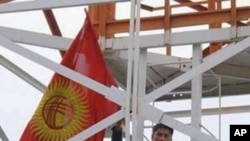Small cracks on the patina of Kyrgyzstan's hastily formed self-appointed coalition government are already apparent.
Former foreign minister Rosa Otunbayeva, the interim leader of the nascent government storms out of her temporary office, Room 308, in the Ministry of Defense.
A few minutes before, from the same floor, a similarly huffy exit was made by her deputy in charge of the country's depleted finances, Almazbek Atambayev. The former prime minister had, hours before, held a news conference to discuss his hastily arranged trip to Moscow, Kyrgyzstan's top aid donor and former patron when the country was a Soviet Socialist Republic. There Atambayev dropped a bombshell, revealing the provisional government was preparing to launch a "special operation" to grab the deposed but still defiant President, Kurmanbek Bakiyev.
Otunbayeva, in her public comments, took a softer tone initially. But she apparently grew increasingly impatient, later warning Kyrgyzstan was on the brink of civil war because of Bakiyev's threat to unleash a new wave of bloodshed should he be targeted.
It would turn out that no further loss of life would be needed to neutralize President Bakiyev. Two days later he would board a military aircraft for Kazakhstan where, according to the provisional leadership, he faxed his resignation to Ms. Otunbayeva.
The 59-year-old Russian-educated polyglot professor and diplomat turned politician is an anomaly as a powerful woman in this predominately Muslim nation best known for its nomads in Kalpaks, woolen and felt hats tall enough to contain their own microclimate.
Otunbayeva comes off as firm but motherly in encounters with correspondents conducted amid an incessant shuttling among meetings with colleagues and visiting diplomats.
Otunbayeva's time will likely be devoted to getting a severely looted capital functioning again while playing the role of chief mourner in wake of the more than 80 deaths during the upheaval.
Otunbayeva is partly distracted by possible usurpers among 13 other opposition figures from various parties who, individually and collectively, are trying to gain legitimacy both in the eyes of the Kyrgyz people and the international community.
But just beyond the reach of the gates of presidential palace looms an even more ominous threat.
At a side entrance to the Defense Ministry, a crowd of men and women have been whipped into a frenzy by a flag-waver who has partly scaled a tower. They demand the deposed president be brought to Bishkek for justice. The vocal group, obviously partly fueled by alcohol, is in no mood to discuss compromise and the nuances of conflict resolution under way by international diplomats who have flown to the capital.
Ms. Otunbayeva would, Friday morning, admit her concern that by permitting Bakiyev to leave the country she might seen as betraying the cause that just a week before had brought her to power.
TULIP REVOLUTION REDUX
The rumblings of discontent do not take long to surface along the city's main street, Prospekt Chui.
Shopkeepers grumble about how the characters composing the interim government are the same ones who helped Bakiyev chase out President Askar Akayev five years ago in the Tulip Revolution when he appeared intent on turning the presidency into a family business -- the same charges that brought the end to Bakiyev's rule.
Now the merchants of the shops and restaurants that line the avenue wonder who will be the next corrupt autocrat to emerge.
Late one evening, after a futile search for an open restaurant serving Kyrgyz cuisine, colleague Peter Fedynsky and I step into a usually popular cosmopolitan Chui Street restaurant. We fail to notice the "Closed" sign on the door but the Russian proprietor takes pity on us and agrees to serve us spaghetti bolognese and a couple of beers.
The other late-night patrons begin to wobble out of the establishment, but spot the two obvious foreigners.
We reluctantly engage them in conversation as they precariously hover above and then, uninvited, plop down into our booth.
Peter, who is fluent in Russian -- the Bishkek lingua franca -- prudently sticks to English.
"I don't know who you are -- FBI or CIA perhaps -- but I don't hesitate to tell you how we feel," one of the group volunteers in English.
It turns out they are "undercover policemen" who claim allegiance with the people and express horror at having witnessed, the previous week, government forces firing bullets into innocent civilians.
I cannot resist telling one of the men that I have heard repeatedly that the snipers on the grounds of the presidential office building, or White House-- the former seat of the Kyrgyz government -- were foreigners.
"Yes," he replies in matter of fact voice. "They were Pakistanis and Indians."
Peter signals to me that further conversation might not be the best course to take, so I do not pursue the potentially volatile line of questioning on the far-fetched possibility Bakiyev hired South Asian assassins to protect his assets.
As the presumed plainclothes cops finally exit, both Peter and I emit subtle sighs of relief.
I ponder all the conspiracy theories circulating in Bishkek. Some Kyrgyz, during the rioting, targeted establishments and businesses of quite disparate scapegoats: Chinese, Jews, Slovaks and Turks.
Kyrgyzstan is a small, young, impoverished and vulnerable state. And it is not unusual for some elements of any society to try to blame internal problems on outsiders. But, hopefully, civil society and the government here will push for a transparent and sober accounting of who was really culpable for turning the sidewalks outside the White House red.








